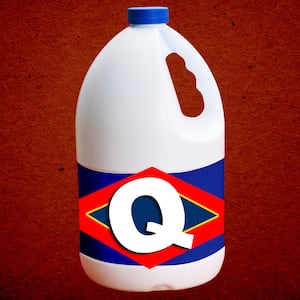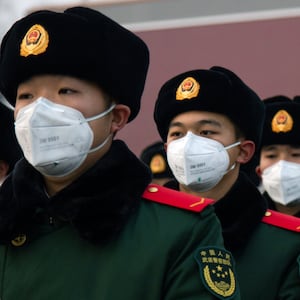NANJING, China—China’s rulers are now calling the coronavirus epidemic a “major test of China’s system and capacity for governance” and Communist Party leader Xi Jinping is warning against any “lack of boldness” fighting it. But infections are rampant, the death toll is still mounting, and the country is increasingly isolated by a world community afraid this could become a pandemic. With no vaccine, hospitals overcrowded, and a dearth of solid information about how to treat the flu-like disease, what are China’s 1.4 billion people (or the rest of us) supposed to do?
The answers have come on the internet: stay away from your pet dog, gargle salt water, fumigate with vinegar, take a potion made from flowers, and smoke a lot.
Yes, fake news has gone viral in the fight against the virus, which you’d expect. But the picture is complicated by the Chinese media’s advocacy of traditional Chinese medicine, and some half-baked reporting that credits U.S. President Donald Trump with possession of a "super drug" he’ll be willing to share real soon.
Chinese citizens hungry for any kind of protection against the disease have been posting and re-posting dubious reports about miracle cures and alternative medicine on the main Chinese social networks: the microblog Weibo and the chat app Weixin.
In a country where many hundreds of millions of people are currently holed up inside, on break from work, and thirsty for any new information about the deadly virus, such bad reporting and fake news that goes viral can provoke some frenzied side effects.
After People’s Daily published an article claiming that scientists researching the novel coronavirus found shuanghuanglian oil, a traditional Chinese medicine concocted from three flowers, was effective treating it, believers in the efficacy of traditional medicine, or TCM, flocked to drug stores and bought up all of it they could find.
Sales and hype were such that the stock price of one producer, Fushen Pharmaceutical Co., soared by 120 percent on the Hong Kong stock exchanges as markets opened February 3. For a brief few minutes, founder and chairman and majority stakeholder Cao Changcheng was a billionaire, richer on paper than Huawei CEO Ren Zhengfei, until the speculative rush died down and the price fell back to its opening level. Even so, at 8 Hong Kong dollars a share it's worth twice what it was two weeks ago.
And while shuanghuanglian, which includes Japanese honeysuckle, Chinese skullcap, and forsythia suspensa and comes in tablet form as well as oil, might not be as dangerous to its users as drinking bleach (a “cure” recommended by QAnon conspiracy theorists in the United States) or consuming the dung and urine of cows, recommended by a swami in India, the injectable form can cause anaphylactic shock if administered to pregnant women or young children.
Although many Chinese publications claim that shuanghuanglian has been shown to be effective against influenza, respiratory illnesses, and a variety of ailments, they did have to report that there is no evidence to suggest it does anything against coronavirus.
Young Chinese laugh at the drama over shuanghuanglian. The Chinese characters used look and sound similar to the characters for double egg yolk lotus seed paste moon cake (shuanghuang lianrong yuebing), prompting the joke that after shuanghuanglian is sold out, people should buy moon cake. Consumption of all manner of TCM products is largely concentrated among their elders. When it is used, it is mostly as a preventative measure in addition to, not instead of, modern medicine. But various herbal products are hardly the only less-than-scientific solutions being offered.
Many viral messages advise people to swish diluted salt water around in their mouth before and after leaving the house as a means to kill the virus. This advice sometimes is attributed falsely to Dr. Zhong Nanshan, who discovered SARS in 2003. While salt water mouthwashes are sometimes used as a home remedy for sore throats or colds, they would do nothing against coronavirus, as multiple Chinese websites have noted.
Other false rumors about the virus claim it is spread by dogs, or that hanging clothes outside can disinfect them.
Combining multiple bullshit ideas, one Chinese blogger wrote, “It’s a disease carried by canines and spread to nearby dogs, dog-to-dog, then dog-to-human. Dogs do not get sick, but humans get sick. After humans get sick, they spread it to dogs, and the cycle continues. … So, people must stay away from dogs. Families who raise dogs must keep their dogs inside the house, and you cannot play with your dog. … Before going out, spray alcohol on your head and clothes. When you return home, wipe your hands, cell phone, and belongings with alcohol. Hang your coat on the open-air balcony to air it out, and gargle diluted salt water.”
Some of the methods of prevention have to be jokes. One post claimed that smoking prevents all varieties of coronavirus because the oil from smoke coats one’s lungs at a “nanometer” level, preventing coronavirus from striking the lung’s cells, almost like your lungs are wearing a “nanometer mask” at the cellular level.
One piece of outright fake news was debunked by official national-level tabloid Global Times Monday afternoon. The false news, shared by a large number of Weibo users on February 2, asserted that there was an “American super drug” that could cure diseases caused by coronavirus and that President Donald Trump was going to fast-track its proliferation to China.
But the story is a little more complicated than smoking and puppy hoaxes.
“Real highly effective drug has come out. It has gone through America’s process for effective medicines. Trump called on America’s Centers for Disease Prevention and Control to publicly release the formulation. I hope our researchers don’t continue to be obsessed with huoxiang zhengqi/hyssop oral oil for vital energy [another Chinese medicine] and shuanghuanglian, and instead quickly try this medicine,” one variation said.
The storyline shares much in common with pro-Trump posts swimming around right-wing corners of the American blogosphere. There’s a simple answer being hidden from the public, and perhaps an exaggeration of some vacuous statement Trump uttered without thinking, about which conspiracy theorists will fill in the blanks.
What Trump did say in an interview with CNBC on January 22 was that, “We have it totally under control. It’s one person coming in from China, and we have it under control. It’s going to be fine. … We do have a plan, and we think it’s going to be handled very well.”
Trump never said anything about America having any kind of secret or fast-track drug. The drug in question, remdesivir, has not been proven effective yet. It was previously tested as a treatment for Ebola in the Congo and performed worse than competitors, but its manufacturers say it has been useful against SARS and MERS, which also are coronaviruses.
The origin of the Chinese fake news apparently can be traced back to a post on January 29 by the Chinese website Science Net. That piece summarized Jon Cohen’s article in Science, published on January 27, about potential existing drug combinations that might work against coronavirus, before adding its own exaggerations and rhetorical flourishes—the “super drug” moniker.
In reality, Cohen’s article notes the apparent effectiveness of remdesivir in a study of mice, and cites a microbiologist agreeing that it is the “most promising drug,” while emphasizing that it is unproven and not available in China.
Gilead, the California-based maker of remdesivir, has issued a statement that the company is in “active discussions with researchers and clinicians in the United States and China regarding the ongoing Wuhan coronavirus outbreak and the potential use of remdesivir as an investigational treatment.” Whether or not remdesivir ultimately is made available, and whether it proves effective, does not hinge on Trump or the CDC, but on the New York Stock Exchange on Monday, Gilead shares shot up 5 percent.
Cohen, who has three decades of experience as a writer for Science and whose writing on coronavirus has been increasingly cited on Weibo, said by email, “I hear from people all over the world, every day, including people from China. Many have questions I cannot answer. Some are pushing their own theories. Some want me to play doctor and want medical advice, which I cannot give. Some are just worried and want accurate information.”







